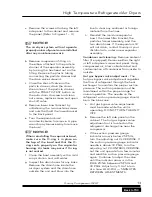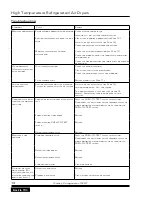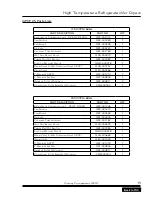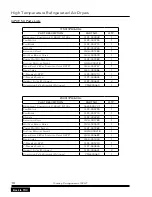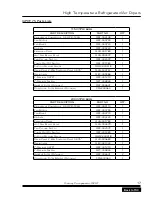
High Temperature Refrigerated Air Dryers
Safety Instructions
When using air compressors and
compressed air accessories, basic safety
rules and precautions must always be
followed, including the following:
READ ALL INSTRUCTIONS FULLY.
Wiring & Breakers
Wiring, breakers and other electrical
equipment must conform to local and
national electrical codes. Do not operate
this unit with damaged wiring or after
the unit or air handling parts have been
dropped or damaged in any manner.
Notify authorized service facility for
examination, repair or other adjustments.
Warning!
Comply with the National Electrical
Code, Federal, State and Local Codes
when installing or operating this unit.
COALESCING OIL FILTER (OPTIONAL)
– CHANGING AND REMOVING
Shut off power and discharge all pressure
from this unit and air system before
removing or adding parts or attachments
and before maintaining unit.
INSPECT HOSES
Regularly inspect hoses and load handling
fittings for signs of damage, deterioration,
weakness or leakage. Do not use if a
defect is found. Remove dryer from
service and repair or discard defective
parts. Keep hoses away from sharp
objects, chemical spills, oil, solvents and
wet floors. All of these can damage a
hose.
USE SUITABLE PARTS & ACCESSORIES
Do not use air pressurized accessories
or parts in the air system not suitable
for the maximum air pressure used. Be
sure maximum pressure specified by the
accessory manufacturer is well above the
working pressure of your compressor.
RELEASE AIR PRESSURE SLOWLY
Fast moving air will stir up dust and debris,
which may be harmful. Release air pressure
slowly when depressurizing your system to
avoid bodily injury.
SECURE DRAIN LINES
Fasten drain lines to floor or drain.
Pressurized air may periodically pass
through drain lines, which will cause an
unsecured line to whip and may cause
bodily injury.
Warning!
Air from compressor and from Models
QPHT 25, 50, 75, 100 and 125 High
Temperature Refrigerated Dryers,
as equipped, is not safe for human
respiration (breathing).
To provide safe, breathable air,
compressor must be capable of producing
at least Grade D breathing air as
described in Compressed Gas Association
Commodity Specification G7.1-1966.
Special filtering, purifying and associated
alarm equipment must be used to convert
compressed air to “Breathing Air.” Other
special precautions must also be taken.
Refer to OSHA 29 CFR 1910.134.
READ THESE INSTRUCTIONS
THOROUGHLY BEFORE USING THIS
UNIT.
2
Quincy Compressor-QPHT
Back to TOC

















